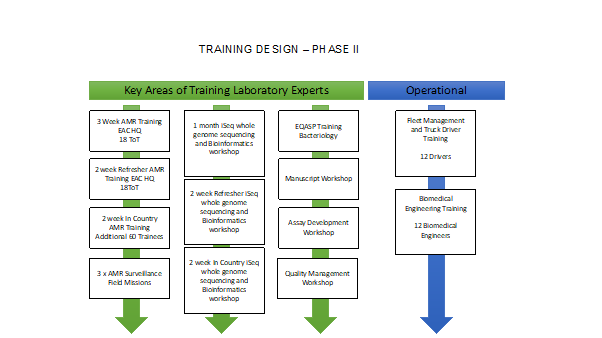EAC Mobile Laboratories Project - Photo Gallery
The purpose of phase I (2017 to 2020) of the EAC regional network of public health reference laboratories for Communicable Diseases project was to install nine (9) mobile laboratories units in order to strengthen the capacity of EAC Partner States to detect and respond to viral pathogens of biosafety levels 3 and 4 nature, with a particular focus on Viral Haemorrhagic Viruses (VHFs), such as Ebola Virus Disease (EVD), Crimean Congo Hemorrhagic (CCHF), Marburg Virus Disease (MVD), Yellow Fever, Rift Valley Fever, among others.
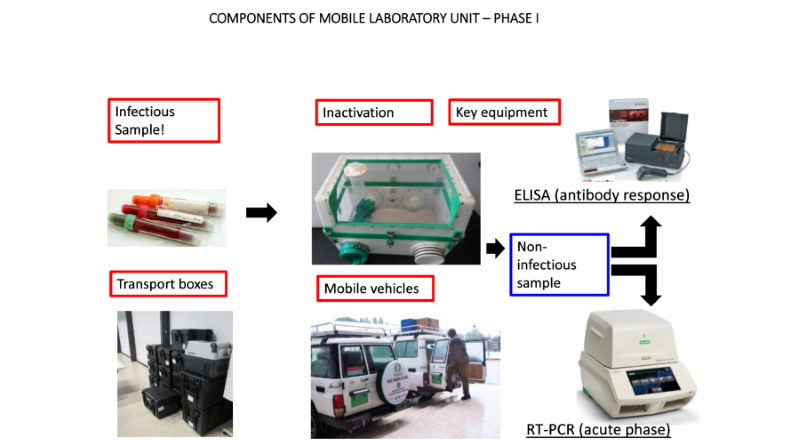
These mobile laboratories are of modular design and, depending on the need, can be packed up in 15-20 boxes and rapidly deployed to any potential outbreak either by car, plane or boat. The key equipment of these laboratories is a BSL3/4 containment glovebox in which viruses and bacteria can be inactivated and rendered non-infectious for further diagnosis. The current setup of these phase I laboratories, however, does not allow the detection of bacterial pathogens and their antimicrobial resistance (AMR) profiles, as these analyses require pre-culture steps of viable bacteria for accurate diagnosis. This gap in diagnostic capacity was a priority issue raised during recent discussions with the Ministries of Health (MoH) and National Public Health Laboratories (NPHLs), during phase I of the mobile laboratory project.
Currently, none of the partner countries has the capacity to safely culture bacterial pathogens in the field and therefore samples need to be collected from peripheral health centres and sent to centralised reference labs (mostly in capital cities) for culturing, diagnosis and antimicrobial resistance testing.
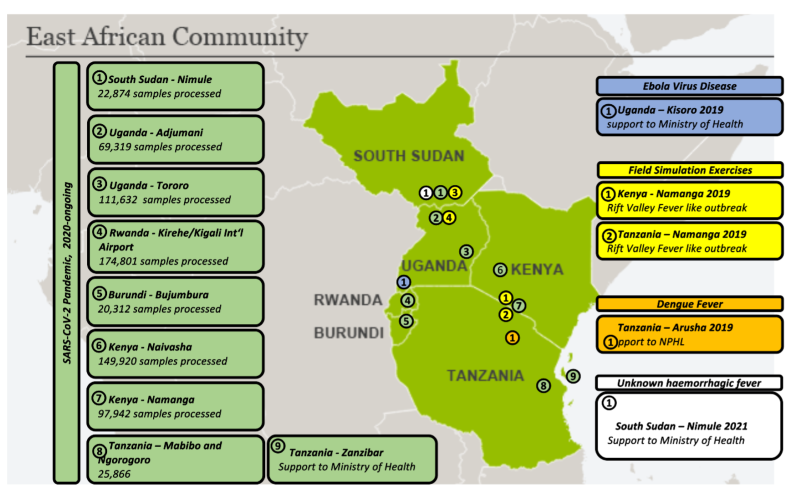
The mobile laboratories field mission serves as; the first respondent to confirm the cause of disease outbreaks (x21), strengthen diagnostics preparedness capacities(x9), and to conduct scientific research (x12). A total of 42 field missions have been conducted in Phase I.
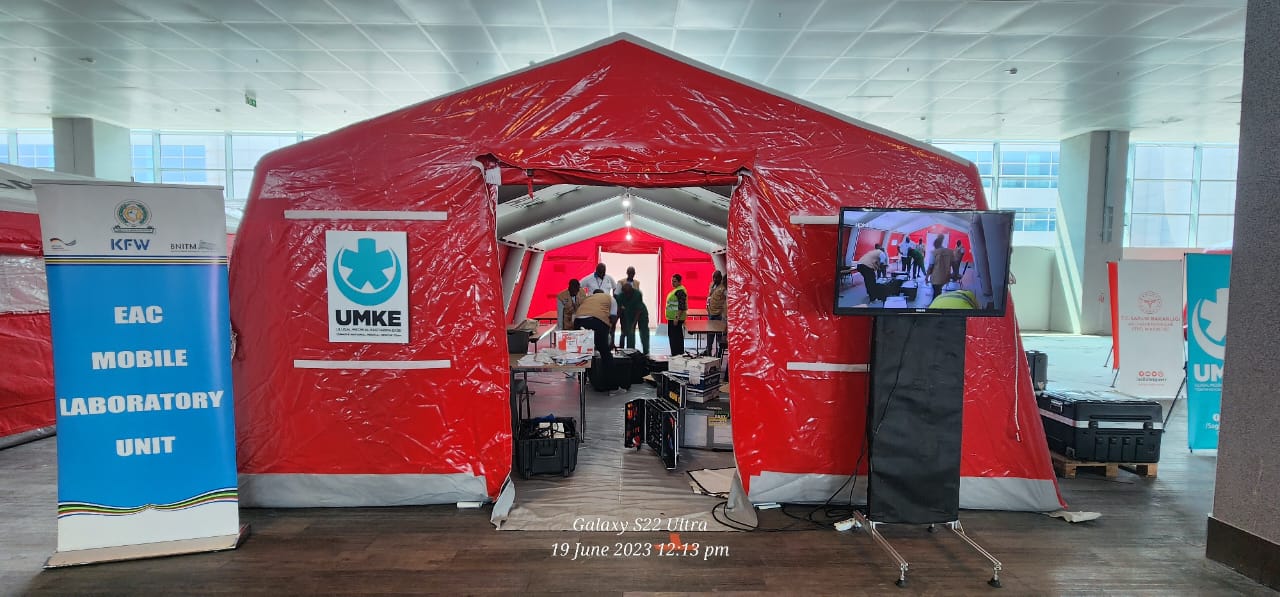
In Summary:
Summary of Field Missions Conducted by the EAC Mobile Laboratories each Partner State
| S/N | Partner State | Field Mission (Outbreak, Training or Studies) | Location/ Period | Duration | Facilitated by |
| 01. |
Burundi |
Sustained COVID-19 deployment to support the COVID-19 national response mechanisms. | Songore Ngozi province; August 2020 | 1week | National Response Mechanisms |
| Kobero OSBP/ Muyinga province; Aug to Sept 2020 |
3 weeks |
National Response Mechanisms | |||
|
Kiremba; Ngozi province; June 2021 |
2 weeks | National Response Mechanisms | |||
|
Kirundo; June 2021 |
2 weeks | National Response Mechanisms | |||
| NPHL; 2020 to 2022 | 2 years | EAC | |||
| COVID-19 field missions for RDT evaluation | NPHL; | 02 weeks | EAC | ||
|
EVD surveillance / preparedness & Refresher training for 12 experts |
Kobero - Muyinga province; Oct 2022 | 02 weeks | EAC | ||
| Muyinga province; 26th June to 9th July 2023 | 02 weeks | EAC | |||
| Mission to assess the prevalence of enteric pathogens | Rumonge province; Bujumbura | 02 weeks | EAC | ||
| 02. |
Kenya |
||||
| Sustained COVID-19 deployment to support the COVID-19 national response mechanisms. | Namanga Health Centre/ Kajiado; ongoing | May 2020 to date |
EAC (02 wks In-country training) National Response Mechanisms (sustained deployment) |
||
| Mai Mahui, Naivasha June 2020 to June 2023 | June 2022 |
EAC (02 wks In-country training) National Response Mechanisms (sustained deployment) |
|||
| Rift Valley Fever (RVF) outbreak mission |
NVRL, early 2021 |
2 weeks | National Response Mechanisms | ||
|
Molecular Detection of Selected Bacterial Enteropathogens |
Kiambu/ NVRL; March 2023 | 2 weeks | EAC | ||
| Molecular Diagnosis of viruses in non-malaria acute febrile illnesses in Garissa County, Kenya |
Garissa; 11th July – 25th July 2023 |
2 weeks | EAC | ||
| 03. |
Rwanda |
Sustained COVID-19 deployment to support the COVID-19 national response mechanisms. |
Kirehe hospital; May to Dec 2020 |
02 weeks |
EAC (02 wks In-country training) National Response Mechanisms (sustained deployment) |
| Kigali airport; Dec 2020 to date | ongoing | National Response Mechanisms | |||
| Rusizi, Western Province; May 2020 to Jan 2023 | ongoing | National Response Mechanisms | |||
| 1 COVID-19 field missions for RDT evaluation. | NPHL, 2021 | 02 weeks | EAC | ||
| EVD deployment in Ruhengeri, Northern Province | Sept 2022 to Jan 2023 | ongoing | National Response Mechanisms | ||
| 4. |
South Sudan |
Sustained COVID-19 deployment as part of the national response mechanisms. | Nimule; May 2020 to June 2023 | 02 weeks |
EAC (02 wks In-country training) National Response Mechanisms (sustained deployment) |
| COVID-19 field missions for RDT evaluation. | Nimule; August to Dec 2020 | 2 weeks | EAC | ||
| Cholera, Shigella and Salmonella | Bentiu and Juba | 2 weeks | EAC | ||
| EVD surveillance/ preparedness | Nimule in Dec, 2022 | 02 weeks | EAC | ||
| Hepatitis E virus mission | July 2023 | 02 weeks | EAC | ||
| Refresher training | July 2023 | 02 weeks | EAC | ||
| 5. |
Tanzania |
||||
|
One Dengue outbreak analysis (determining the outbreak serotype using novel technology) |
EAC Secretariat | 2 weeks | EAC | ||
| 2 COVID-19 field missions in Zanzibar for RDT evaluation | Zanzibar; 2021 | 4 weeks | EAC | ||
| deployment to support centralized testing | NPHL; May 2020 | ongoing | National Response Mechanisms | ||
| One sustained field deployment for COVID-19 response | Ngorongoro Conservation area (Oct 2021 to Dec 2022); | 02 years | National Response Mechanisms | ||
| Two (02) field missions on diagnosis of non-COVID-19 Respiratory viruses | NPHL; Feb- March 2023 | 04 weeks | EAC | ||
| sustained Ebola Virus Disease (EVD) preparedness mission | Kabyaile Health Center, Kagera Region; Oct to March 2023 | 04 months | National Response Mechanisms | ||
| Sustained Marburg virus disease outbreak mission in URT | Kabyaile Health Center, Kagera Region; March 2023 to date | ongoing |
EAC (02 wks In-country training) National Response Mechanisms (sustained deployment) |
||
| 6 |
Uganda |
field mission at Uganda-DRC border to assist in EVD response |
Kisoro Hospital, 2019 |
4 weeks | EAC |
|
Continuous Field deployment since June 2020 in the COVID-19 national response mechanisms |
Adjumani Hospital, June 2020 | ongoing |
EAC (02 wks In-country training) National Response Mechanisms (sustained deployment) |
||
| Tororo hospital May 2022 | ongoing |
EAC (02 wks In-country training) National Response Mechanisms (sustained deployment) |
|||
| 2 COVID-19 field missions in Tororo and Arua for RDT evaluation | Adjumani & Tororo (Mbale, Soroti); 2021 | 2 weeks | EAC | ||
| Sustained Ebola Virus Disease Response Missions and a sustained deployment in | Mubende, September, 2022 to March 2023 | 6 months |
EAC (04 wks In-country training) National Response Mechanisms (sustained deployment) |
||
| MVD preparedness mission | Mutukula; March 2023 to May 2023 | 02 months | National Response Mechanisms | ||
| Regional Missions | EAC/WHO Simulation Exercises for the Rift Valley Fever (RVF) | Namanga Health Centre/ Kajiado; | June 2019 | EAC | |
| EAC/WHO Simulation Exercises for the Rift Valley Fever (RVF) |
Namanga, June 2019 |
1 weeks | EAC |
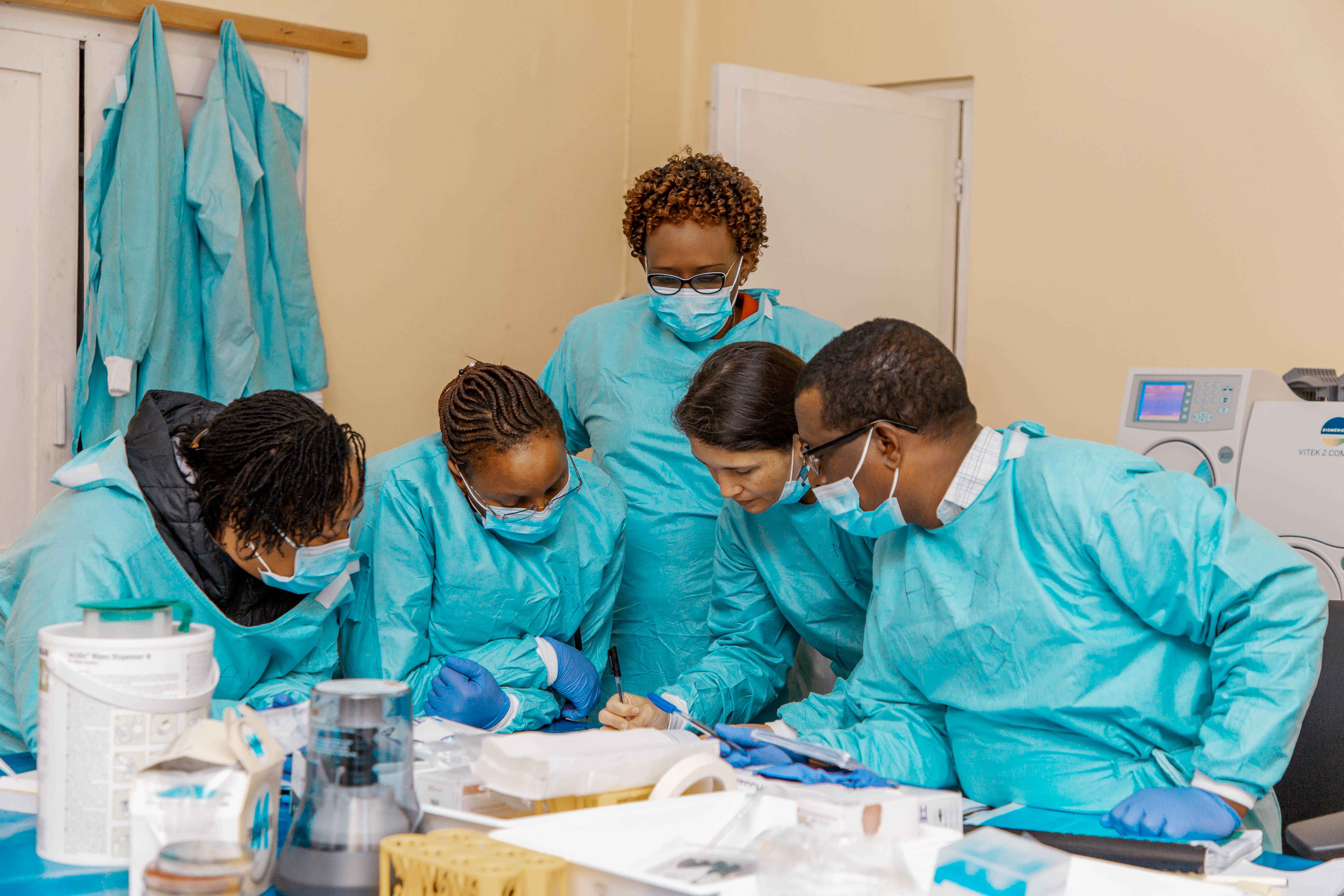
The project embarked on various training programs to create, maintain and expand the pool of laboraoty experts in the EAC Region. In summary, a total of sixteen (16) training programs were conducted over the period, resulting in about 406 trained laboratory experts
Summary of Training Sessions Conducted by the EAC Mobile Laboratories Project
| S/N | Training Program | Total (406) | ||||||
| Burundi | Kenya | Rwanda | South Sudan | Tanzania | Uganda | Total | ||
| 1 | Operation of mobile laboratories (practical for trainers) | 2 | 2 | 2 | 2 | 2 | 2 | 12 |
| 2 | Diagnosis and handling of biosafety level 3 and 4 pathogens (accelerated Ebola response) | 2 | 2 | 2 | 2 | 2 | 2 | 12 |
| 3 | Diagnosis of Corona Virus using BNITM in-house kits (trainers) | 1 | 1 | 1 | 1 | 1 | 1 | 6 |
| 4 | Operation of mobile laboratories in Partner States (users) | 14 | 7 | 12 | 5 | 21 | 45 | 102 |
| 5 | Shipment of infectious substance according to International regulations (IATA) | 18 | 18 | 16 | 11 | 17 | 15 | 95 |
| 6 | Seegene Analysis Software | 2 | 2 | 2 | 2 | 2 | 2 | 12 |
| 7 | Drivers of the mobile laboratory vehicles (specialized in use and maintenance) | 2 | 5 | 2 | 2 | 3 | 5 | 19 |
| 8 | M-pox diagnosis (emergency trainers) | 2 | 2 | 2 | 2 | 2 | 2 | 12 |
| 9 | Diagnosis of bacteriological pathogen identification and antibiotic resistance detection (trainers) | 3 | 3 | 3 | 3 | 3 | 3 | 18 |
| 10 | Local production of Proficiency Test (PT) panels for EQA programs (Partner States) | 5 | 13 | 5 | 5 | 9 | 7 | 45 |
| 11 | Diagnosis of Ebola Virus Disease | 0 | 0 | 0 | 0 | 0 | 8 | 8 |
| 12 | Scientific manuscript writing | 3 | 3 | 3 | 3 | 0 | 3 | 15 |
| 13 | Laboratory Information Management System (LIMS) (users) | 2 | 2 | 2 | 2 | 2 | 2 | 12 |
| 14 | Bioinformatics training on antimicrobial resistance (AMR) | 2 | 2 | 2 | 2 | 2 | 2 | 12 |
| 15 | Bioinformatics training on genomic viral sequencing | 2 | 2 | 2 | 2 | 2 | 2 | 12 |
| 16 | Assay development (local production of testing kits) | 2 | 2 | 2 | 1 | 2 | 3 | 12 |
| Total | 63 | 65 | 57 | 47 | 71 | 103 | 406 | |
The project was established under directive (EAC/Health/SCM13/Directive 36). The key objective is to strengthen the capacity of Partner States to rapidly detect and respond to disease outbreaks. This is being achieved through the mobile laboratory networks divided into two phases of implementation. Phase II (2021-2024) focuses particularly on antimicrobial resistance (AMR) surveillance and response.
Procurement of container mobile laboratory units
